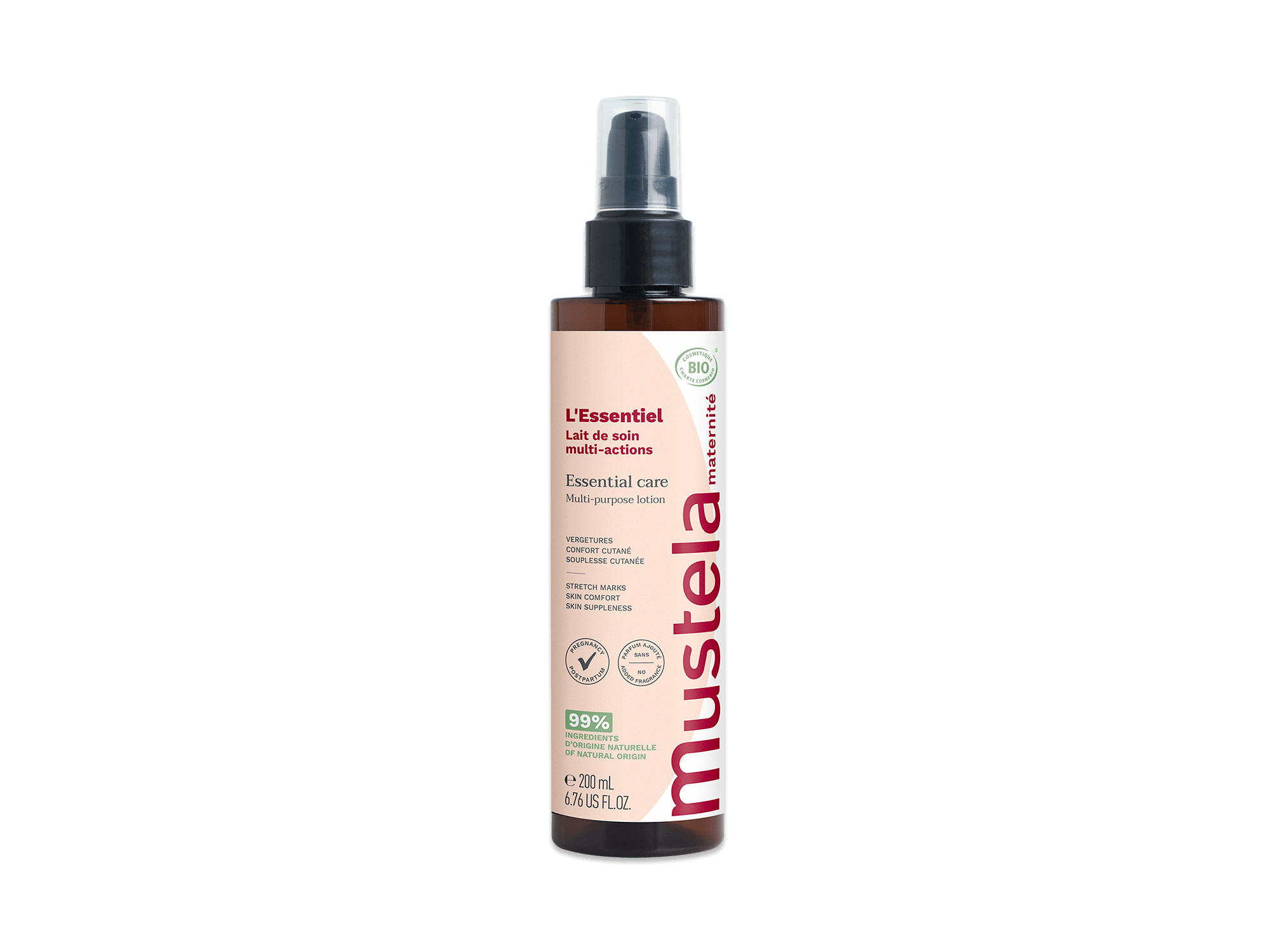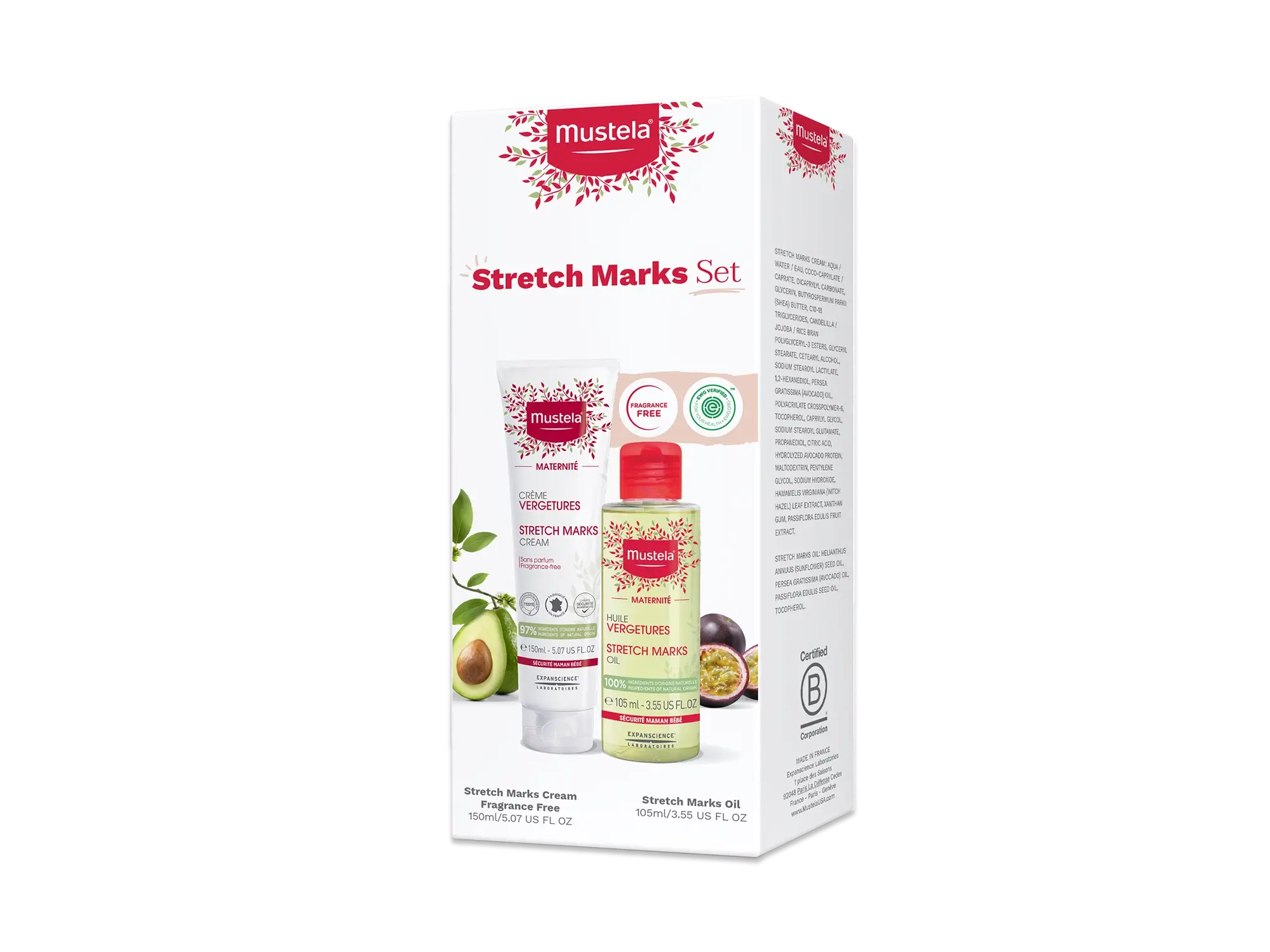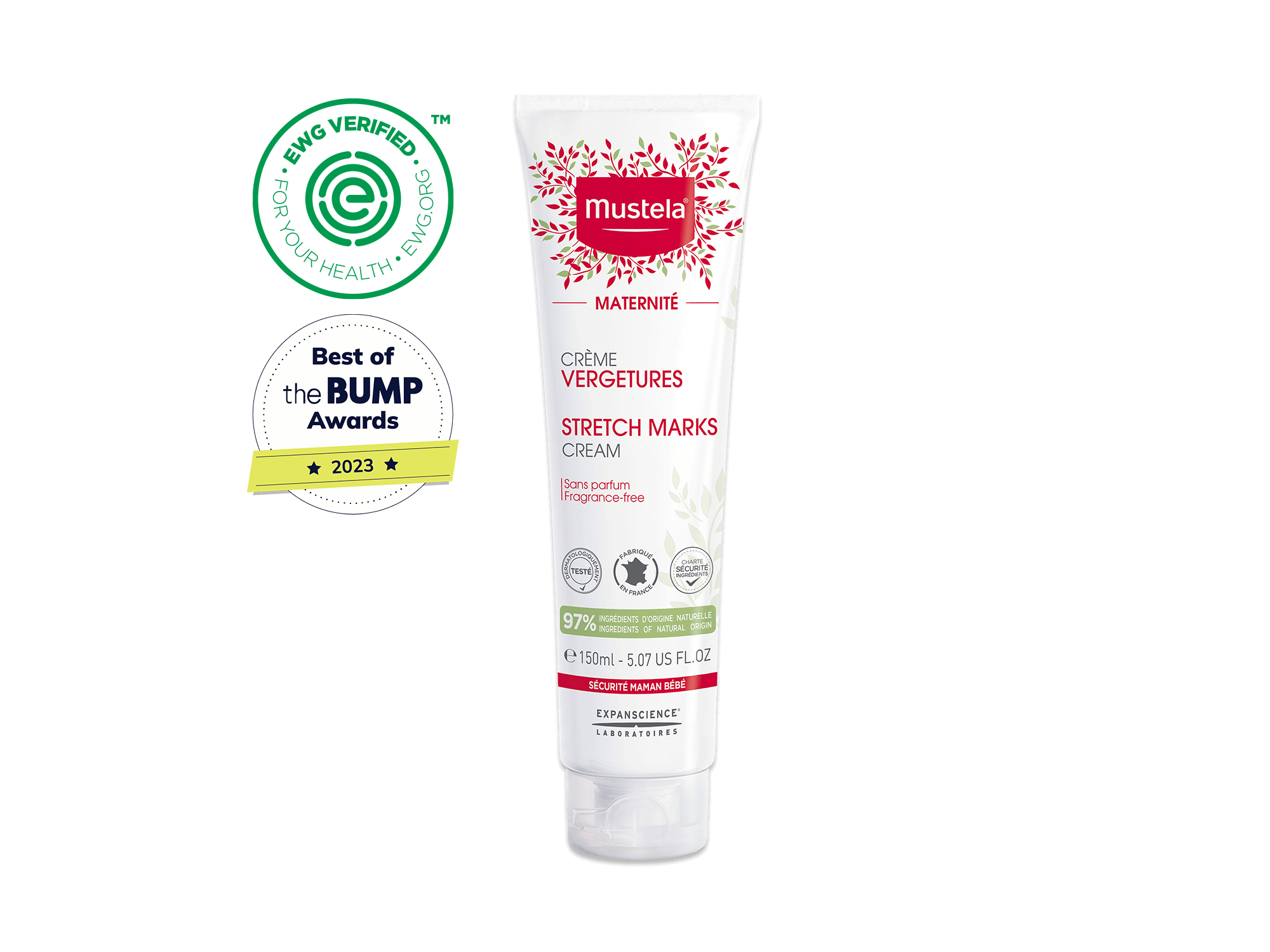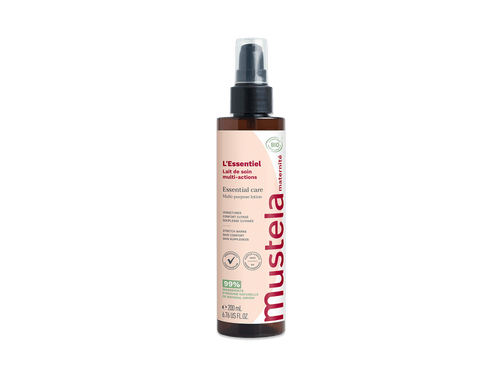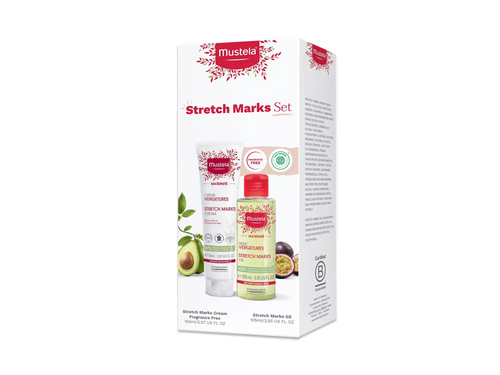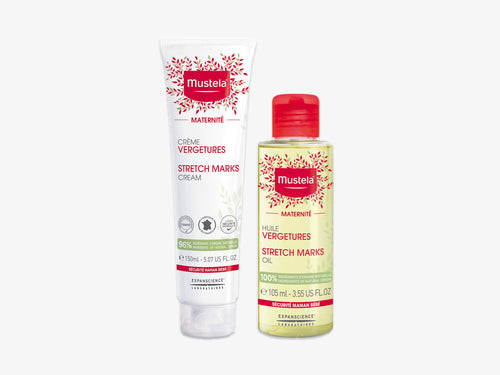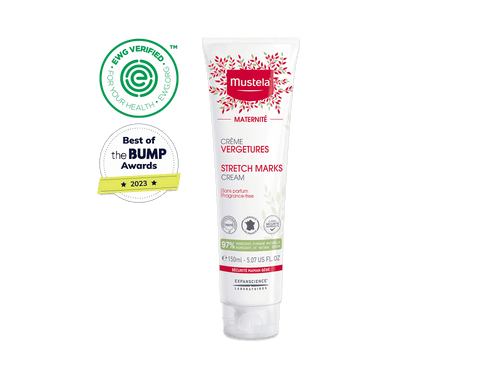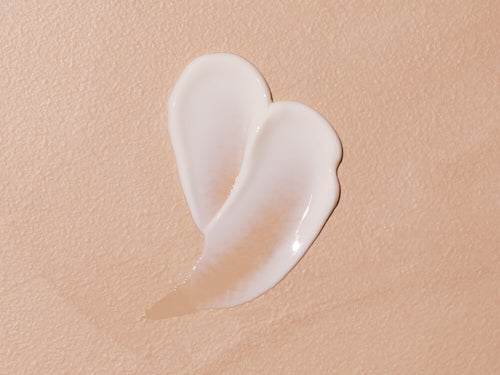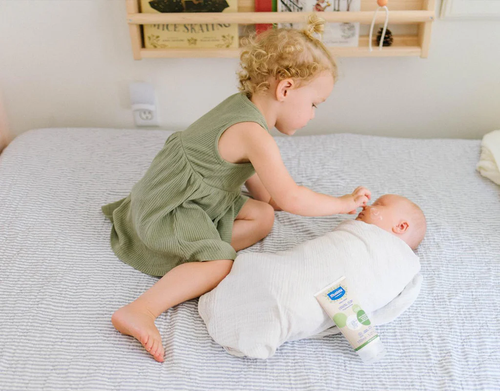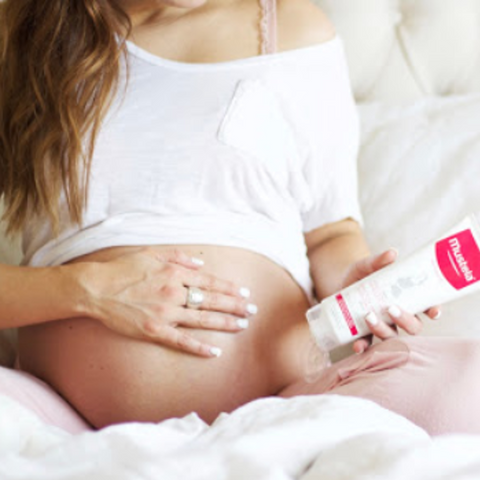Pregnancy is both exciting and nerve-wracking at the same time. It’s exciting because you’ve got a wonderful little life growing inside you. It’s nerve-wracking because your body is going through a lot of changes to make that life possible.
One of the earliest changes you’ll experience is dry skin. And if you’ve never dealt with dry skin before, it can come as quite a shock.
But don’t head straight to your doctor or dermatologist. Let the experts at Mustela calm your nerves and show you how to treat and prevent dry skin during pregnancy.
After we introduce you to a bit of skin science and investigate the causes of dry skin, we’ll answer these common questions (and more):
- Should I wash with hot, warm, or cool water?
- Should I exfoliate, and if so, how often?
- When should I moisturize?
Before we answer those questions, though, let’s learn a bit about your skin and what causes it to become dry.
Skin Science
Your skin is composed of many layers. The three main divisions from inside out are the:
- Hypodermis
- Dermis
- Epidermis

Each of those main divisions can be subdivided into smaller layers. For the purposes of this article, we’ll be focusing on the outermost layer of your skin, the epidermis.
More specifically, we’ll be zeroing in on a small layer of the epidermis known as the stratum corneum. The stratum corneum is the part of your skin that is exposed to the air around you. It’s the part you can see with your naked eye.
On top of the stratum corneum is a layer of water, fat, and wax called the hydrolipidic barrier. The purpose of this oily barrier is twofold:
- Keep toxins like dust, dirt, pollen, and pet dander away from the stratum corneum.
- Prevent moisture from evaporating off the surface of your skin.
It’s this last purpose—moisture evaporation—that we’re most concerned with today. That’s because when the hydrolipidic barrier breaks down, dry skin rears its ugly head. Let’s investigate this in a bit more detail.
The Causes Of Dry Skin
The hydrolipidic barrier is sensitive to all kinds of internal influences. It can be affected by external factors, but, for the most part, the hydrolipidic barrier is controlled from inside your body.
Chief amongst those internal influences are disproportionate hormone levels. And what is one time in your life when your hormone levels are up and down every day? Pregnancy.
When hormone levels begin to fluctuate, the hydrolipidic barrier can thin, weaken, and even break down (form holes) in spots. These “holes” allow moisture to evaporate quickly off the surface of your skin. This results in dry, cracked, itchy skin.
Think of it this way: the hydrolipidic barrier is like a lid on a pot of water. When the water is boiling inside the pot, the lid prevents the steam from boiling off into the air. But what if the lid has holes in it? The steam escapes through those holes into the air. That’s what’s happening when you develop dry skin during pregnancy.
Additionally, your immunologic system changes during pregnancy to tolerate the fetus. This is a little bit like in atopic eczema and may lead to dryness. And, lastly, when the skin is stretched, it gets a little bit dry and inflamed.
So now that you know what causes dry skin, let’s get to the more important part: how to treat and prevent it.
How To Treat & Prevent Dry Skin During Pregnancy
Ultimately, treatment and prevention for dry skin during pregnancy comes down to keeping moisture in your skin. The best way to do this is to preserve the hydrolipidic layer that’s still there, and use products that can fill in the holes until your hormones settle down.
Here are five ways to nurture your hydrolipidic layer and prevent moisture from evaporating off your skin.
1) Wash With Lukewarm Water Instead Of Hot Or Cold Water

Extreme temperatures—be they air or water—can weaken your hydrolipidic layer and, at the same time, steal the moisture that keeps your skin soft and supple. That’s why it’s so important to avoid washing with either hot water or cold water.
Instead, adjust your shower or bath water more toward the middle (lukewarm) of the scale. For those of you who want more precise numbers, think body temperature (around 98.6 degrees Fahrenheit).
For those of you with more sensitive skin, five degrees on either side (about 93 degrees to 104 degrees Fahrenheit) is still considered lukewarm.
2) Avoid Rough Fabrics
Because of the weak, or nonexistent, hydrolipidic barrier, dry skin is especially susceptible to micro-damage and irritation from external sources. One of the most common sources of irritation are rough fabrics. Thankfully, that’s also one of the easiest variables to change.
When choosing clothing, always put the softest, most breathable fabrics next to your skin. At the same time, try to keep rough fabrics like wool and denim from repeatedly rubbing against dry patches.
And don’t forget about drying off after you shower. Even the softest towels can cause irritation if you rub too hard. That’s why we suggest you pat your skin dry instead of rubbing back and forth.
3) Exfoliate Less Often
Exfoliation can be part of a healthy skincare routine outside of pregnancy. However, the hyperpigmentation and fluctuating hormone levels that occur during pregnancy can make exfoliation an issue.
We recommend reducing how often you exfoliate to a maximum of once a week to preserve your skin’s delicate balance.

Additionally, if you choose to exfoliate, it’s important to use a gentle exfoliant so as not to further irritate dry skin. One of our favorites is baking soda. We like it because it’s all-natural, easily-obtainable, affordable, won’t harm your baby, and can be used on any part of your body.
Check out our article Is Your Skincare Routine Safe For Your Pregnancy? for a great all-natural baking soda exfoliant recipe.
4) Moisturize In The Morning & Before Bed
Remember, the whole reason you’re suffering from dry skin is because moisture is evaporating too quickly. You can work to keep that water on your skin where it belongs by applying a moisturizer in the morning, before bed, and several times in between.
Moisturizers are formulated to set up a barrier between the outside air and your skin to keep water from evaporating (much like the hydrolipidic layer does).
But not all moisturizers are created equal...especially for pregnant moms. That’s why we recommend a pregnancy-safe skincare product like our Essential Care Multi-Purpose Lotion. All of Mustela’s products are:
- Formulated with ingredients of natural origin per ISO 16128 standard
- Compatible with breastfeeding
- Safe for mom and baby
You couldn’t ask for more benefits in one bottle!
5) Treat Stretch Marks And Dry Skin Will Stay Away

Stretch marks are another skin concern you have to contend with when you get pregnant. The nice thing about stretch marks—if anything about them can be called “nice”—is that treating and preventing them often keeps other skin problems at bay...including dry skin.
So if you focus on keeping your skin healthy and stretch-mark free, the dryness will disappear as well.
We recommend products like Mustela’s:
Each of these products works to keep skin soft and supple and minimizes the fine lines that form on your thighs and belly. In the process, you’ll be putting more moisture into your skin and also keeping it from escaping. That’s the recipe for treating and preventing dry skin.





